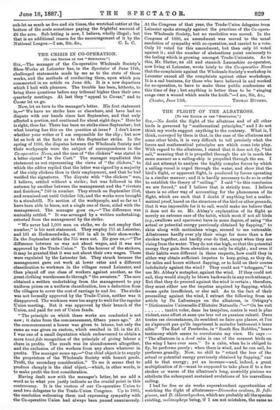THE CRISIS IN CO - OPERATION. rre TED EDITOR or rine "Braorma."1
Silk—The manager of the Co-operative Wholesale Society's Shoe-Works at Leicester has, in the Spectator of June 11th, challenged statements made by me as to the state of those works, and the methods of conducting them, upon which you -commented in an article on Jane 4th. It is a new departure which I hail with pleasure. The trouble has been, hitherto, to bring these questions before any tribunal higher than their own quarterly meetings. At last they "appeal to Crew," and to -Caesar let us go.
Now, let us turn to the manager's letter. His first statement is,—" We have no strike here or elsewhere, and have had no -dispute with our hands since last September, and that only affected a portion, and continued for about eight days." Here he is right, thus far. There has been no strike since September ; but what bearing has this on the question at issue ? I don't know whether your writer or I am responsible for the slip ; but now let us look at the facts as to this September strike. In the spring of 1886, the disputes between the Wholesale Society and their workpeople were the subject of correspondence in the Co-operative News, and the case of "the clickers" was stated in a letter signed "In the Cart." The manager repudiated this statement as not representing the views of "the clickers," to which the editor replied that the letter was signed by a majority of the sixty clickers then in their employment, and that he had verified the signatures. The dispute with "the clickers" was, I believe, settled without a strike ; but was followed in the -autumn by another between the management and the "riveters and finishers," 240 in number. They struck on September 21st, -and remained out until October 5th, and the works were brought to a standstill. No section of the workpeople, and so far as I have been able to learn, not a single one of them, sided with the management. The manager goes on,—" The difference was Amicably settled." It was arranged by a written undertaking, -extorted from the management by the strike.
"We never had 1,000 men on strike, we do not employ that -number," is his next statement. They employ 755 at Leicester, and 161 at Herkmondwike, or 916 in all in their shoe-works. In the September strike the 755 were out. He goes on,—" The -difference between us was not about wages, and it was not -approved by the Trade-Union." To the honour of the strikers, sit may be granted that it was not about their own wages. These were regulated by the Leicester list. They struck because the management gave out work at lower rates and a different -classification to workmen in the villages round Leicester, and 'then played off one class of workers against another, as the great clothing warehouses do through "the sweaters." The men -obtained a written undertaking from the management to pay uniform prices on a uniform classification, less a deduction from the 'villagers to cover the cost of carriage to and fro. The strike was not formally approved by the Trade-Union, neither was it disapproved. The workmen were too angry to wait for the regular 'Union meeting. But it was approved by their branch of the Union, and paid for out of Union funds.
"The principle on which these works are conducted is not scow; it dates from the commencement, fifteen years ago." At the commencement a bonus was given to labour, but only the same as was given on custom, which resulted in 2d. in the 21. I was one of a small deputation which endeavoured to obtain a more bond.fi,de recognition of the principle of giving labour a share in profits. The result was its abandonment altogether, and the exclusion of the workers from any share whatever in profits. The manager sums up,—" Our chief object is to supply the proprietors of the Wholesale Society with honest goods. Profit, the secondary consideration." To me it seems that to produce cheaply is the chief object,—which, in other words, is to make .profit the first consideration.
Having dealt now with the manager's letter, let me add a word as to what you justly indicate as the crucial point in this controversy. It is the custom of our Co-operative Union to send two delegates to the Trade-Union Congress. Up to 1885, the resolution welcoming them and expressing sympathy with the Co-operative Union had always been passed unanimously. At the Congress of that year, the Trade-Union delegates from Leicester spoke strongly against the practices of the Co-opera- tive Wholesale Society, but no resolution was moved. In the Congress of 1886, an amendment was moved to the usual resolution of sympathy with co-operation, and carried to a vote. Only 10 voted for this amendment, but then only 56 voted against it; and the number of abstentions point ominously to the feeling which is growing amongst Trade-Unionists. As to this, Mr. Slatter, an old and staunch Lancashire co-operator, now living at Leicester, wrote lately to the Co.operative News that the complaints against the Wholesale Society's workshop in Leicester exceed all the complaints against other workshops. It is a sad business, for those who have believed in and worked for co-operation, to have to make these public confessions at this time of day ; but anything is better than to be "singing songs over a wound which needs the knife."—I am, Sir, &a.,


































 Previous page
Previous page